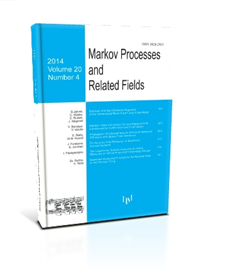Rate of Convergence in the Strong Law of Large Numbers for Markov Random Walks
C.D. Fuh
2021, v.27, Issue 3, 467-488
ABSTRACT
Let $\{X_n,n\geq0\}$ be a Markov chain on a general state space ${\cal X
}$ with
:[3933:7354:0620/095004.502944:ERROR:passman_store_impl.cc(1331)] Get autofillable logins count.
$\sigma$-algebra $\cal{A}$. Suppose that an additive component $\xi_n$, $n\geq1$,
taking values in $\cal{R}$, is adjoined to the chain such that $\{(X_n,\xi_n),
n\geq 1\}$ is a Markov chain on ${\cal X} \times \cal{R}$, and
$P\{(X_{n+1},\xi_{n+1})\in A\times B|X_n=x, {\cal F}_n\}
=P\{(X_{n+1},\xi_{n+1})\in A\times B|X_n=x\}=P(x,A\times B)$
for all $x\in {\cal X}$ and $B\in \cal{B}$ (:=Borel $\sigma$-algebra on $\cal{R}$),
where $\cal{F}\mbox{$_n$}$ is the $\sigma$-algebra generated by $\{X_0,\cdots,X_n,\xi_1,\cdots,\xi_n\}$.
Let $S_n=\sum_{k=1}^{n}\xi_k,$ with $S_0=0$. The chain $\{(X_n,S_n),n\geq 0\}$ is
called a {\em Markov random walk}, with transition probability kernel $P$.
Under some regularity conditions, the strong law of large numbers (SLLN)
implies that for every $x \in {\cal X}$, for all $\varepsilon>0,p_{x,\varepsilon}
(m):=P\{n^{-1}S_{n}-\mu > \varepsilon \mbox{ for some } n\geq m |X_{0}=x\}$
decreases to $0$ as $m$ increases to $\infty$, where $\mu = \int_{x\in {\cal X}}
\int_{-\infty}^{\infty}P\{\xi_{1}>z| X_{0}=x\}dzd\pi(x)$. In this paper, we shall determine the order of magnitude of
$p_{x,\varepsilon}(m)$, as $m \to \infty$, and shall also identify the
behavior of certain quantities in the asymptotic expression for
$p_{x,\varepsilon}(m)$ in the case of $\varepsilon$ being small.
Keywords: Harris recurrent, Large deviation, Markov Wiener\tire Hopf factorization, Markov renewal theory
COMMENTS
Please log in or register to leave a comment

